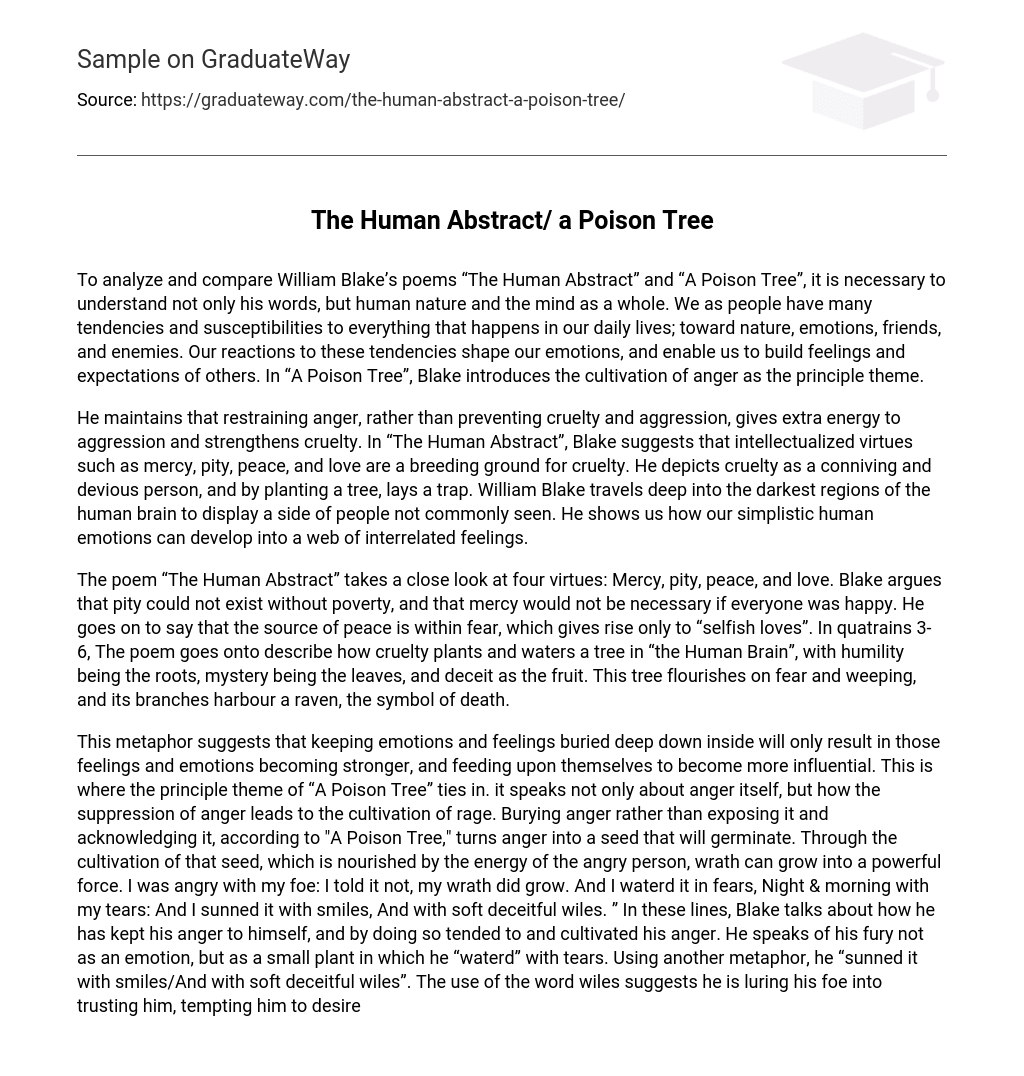To analyze and compare William Blake’s poems “The Human Abstract” and “A Poison Tree”, one must comprehend both his words and the entirety of human nature and the mind. As individuals, we possess various inclinations and vulnerabilities towards all aspects of our daily existence, including nature, emotions, friends, and enemies. Our responses to these inclinations not only impact our emotions but also allow us to develop sentiments and expectations towards others. In the poem “A Poison Tree,” Blake explores the cultivation of anger as the central theme.
According to Blake, restraining anger does not prevent cruelty and aggression but actually fuels them and makes them stronger. In his poem “The Human Abstract”, Blake argues that virtues like mercy, pity, peace, and love, when rationalized or intellectualized, can actually give rise to cruelty. He portrays cruelty as a cunning and deceitful individual who sets a trap by planting a tree. William Blake explores the depths of the human mind to reveal an aspect of humanity that is often overlooked. He demonstrates how our basic human emotions can evolve into a complex network of interconnected feelings.
The poem “The Human Abstract” examines the virtues of Mercy, pity, peace, and love. Blake argues that poverty is necessary for pity to exist and that happiness eliminates the need for mercy. He further suggests that fear is the source of peace, which only leads to selfish forms of love. In stanzas 3-6, the poem describes how cruelty nurtures a tree in the human brain, with humility as the roots, mystery as the leaves, and deceit as the fruit. This tree thrives on fear and tears, and its branches shelter a raven, symbolizing death.
The metaphor implies that suppressing emotions will only make them stronger and more influential. This aligns with the main theme of “A Poison Tree,” which addresses the cultivation of rage through the suppression of anger. By burying anger instead of acknowledging it, anger becomes a seed that grows with nourishment from the angry person’s energy, transforming into powerful wrath. The poem depicts this process: “I was angry with my foe: I told it not, my wrath did grow. And I waterd it in fears, Night & morning with my tears: And I sunned it with smiles, And with soft deceitful wiles.” Here, Blake describes how he kept his anger to himself and nurtured it like a small plant, watering it with tears and “sunning” it with smiles and deceitful actions. The word “wiles” suggests he entices his foe into trust, tempting them with something alluring but ultimately destructive.
In this passage, the speaker describes how the act of suppressing anger can be enticing to his enemy, similar to the appealing nature of deceit depicted in “The Human Abstract”. The mention of the “apple bright” in “The Poison Tree” suggests that his emotions have become significant enough to take on a tangible form.
The apple in question has the appearance of temptation since it is bright and looks ripe. “The Human Abstract” argues that traditional Christian virtues like mercy and pity are based on the assumption of poverty and suffering in the world. This suggests that these virtues do not require any action to alleviate suffering or establish a more just world. The poem rejects the idea of these virtues as ideals because they would not serve any purpose in an ideal world without poverty or suffering. Christians view the raven as a symbol of damnation, responsible for carrying their souls to it.
A religious parallel can be observed in the poem “The Poison Tree” with the presence of the apple. The apple serves as a contrast to the forbidden apple from the Tree of Knowledge in the Garden of Eden. This comparison allows the speaker to express his anger towards his foe by alluding to God’s anger towards humanity. The speaker describes how God, filled with holy fears, sheds tears and waters the ground. From this, Humility emerges and takes root beneath God’s foot. In the poem “The Human Abstract,” Humility is depicted as an acceptance that follows after seeking forgiveness for one’s sins. This religious element becomes the foundation for a tree that envelops the speaker with a sense of mystery.
Blake suggests that the word of god is being refuted, as humility is only present due to “holy fears” (fear of eternal damnation for not confessing sins). In “A Poison Tree,” Blake reveals the possibility of his foe’s death beneath his tree, potentially caused by eating the forbidden apple. This connects to the deadly raven residing in the tree of deceit in “The Human Abstract,” infested with caterpillars and flies that can harm the tree and spread illness.
The central ideas explored in “The Human Abstract” and “A Poison Tree” center around the suppression of anger and the impact of religious teachings on human emotions. Both poems present a moral message rather than completely critiquing the theological framework. They simply highlight that an intense religious belief can often lead to increased grief from not resolving one’s sins, rather than experiencing pure happiness derived from the expected love of a higher power. In his poem, Blake illustrates that repressing emotions instead of expressing them ultimately taints those feelings and erodes one’s innocence.
Blake believed that among Christian faith, there was a prominent incident. He believed that adherents of conventional Christianity were taught to maintain hypocrisy, leading them to pretend to be happier than they really were. This allowed them to hide evil intent and perform evil deeds while appearing virtuous. These poems expose the unpleasant side of human form, which is self-absorption. They reveal the true nature of mankind, showing that even when following religious doctrine, people can still be naturally evil and corrupt.





